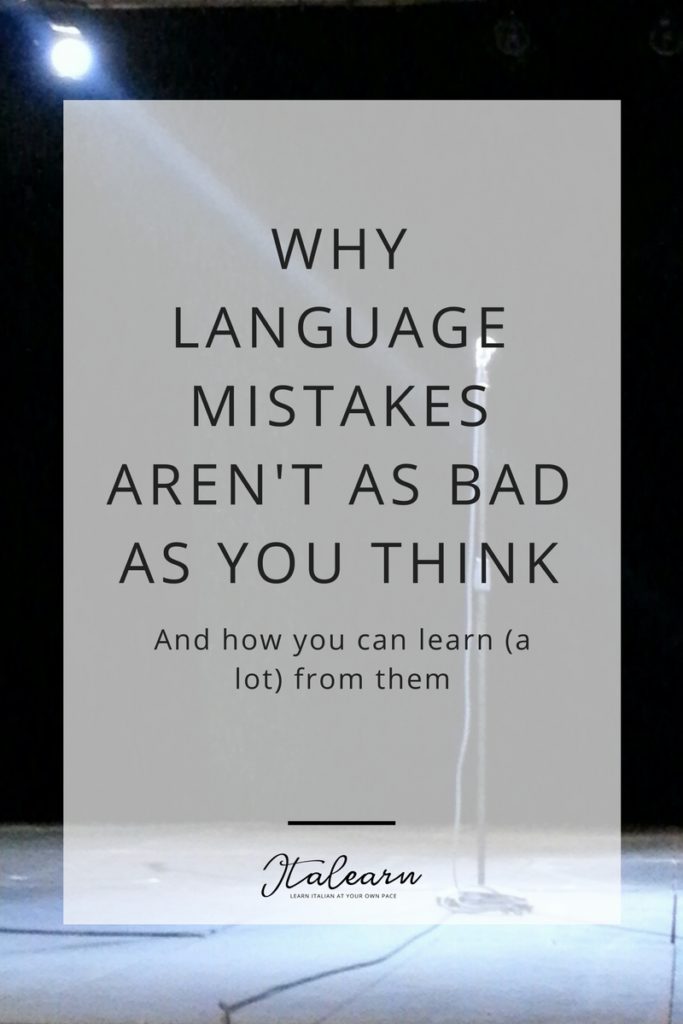The first light turns on, pointing at you from the left. The second light turns on pointing at you from the right. The stage is fully lightened now and you are standing there in the middle, you can’t see the audience but you know they are there. You can hear them mumbling, their impatience growing because you remain silent.
You don’t know what to say anymore, you think that everything you are going to say will be a mistake.
The feeling of embarrassment grows and your face shows tension, powerfully. They are going to judge you. They are already doing it, and there is no escape by now.
Your fists are clenched, your stomach is upside down, and you have started to sweat profusely. Yes, everything you are going to say from now on, if you ever make it to say anything at all, is going to be wrong.
The hatch under your feet started to crackle a minute ago, or maybe it was an hour ago, you have lost track of time, but don’t think about it now because you’re unstable on your own two feet. You’re about to collapse.
This never happens in reality of course, but it’s what many of us feel when we have to speak the language we are learning in public. The feeling of standing on a pedestal waiting for judgement. That terrible, awful feeling of being about to say something so ridiculous that they are going to start laughing at you, straight in your face.
We are so hard on ourselves sometimes that we enter the self-sabotage mode, and once we’re there, getting out is the most difficult thing ever.
It only takes a second of conscious effort to realize that a tiny, silly mistake is not the door to language perdition.
It is, instead, our best friend telling us that we should find another way to get where we want to get. Mindset is everything when it comes to judge ourselves, if you accept that making mistakes is part of the ride, you will reap results. If you condemn yourself for making mistakes on a foreign language, it will impact negatively on your self esteem. And there is absolutely no need for that.
I tend to be a perfectionist when it comes to my work, I would like that everything I create is immune from defects (including typos and grammar mistakes) and is just… perfect. But, as many friends told me, done is better than perfect. And it is true, if I wait for everything to be perfect I might as well wait forever.
For me making mistakes in a foreign language does feel like standing on an empty stage with all eyes on me. Let alone making mistakes in my native language!
It has taken me a few years and a few languages (and tests, exams, essays, etc.) before I realized that the fear of making mistakes when speaking a new language is totally unmotivated. It was actually when I started studying for my teaching certificate that this concept became even clearer and truer. So true that it is now like a mantra for me, and I’ll try to pass it on to you.
What is a mistake, really?
The first thing that caught my attention while I was studying is the difference between error and mistake. These two words are synonyms for sure, but in linguistics they are considered two different things.
An error is made when the learner doesn’t have any previous knowledge of a specific rule, so its causes are external. Usually, the correction of the error is performed by the teacher or other language facilitators.
A mistake is made when the learner temporarily forgets a specific rule, so the causes of mistakes depend on the learner. In case of mistakes usually the correction is also performed by the learner or speaker. Of course, the teacher can offer some inputs and feedback to point the student in the right direction.
Native speakers most of the times make mistakes, not errors, and most of the times they are able to correct themselves almost instantly.
It is important to recognize both errors and mistakes and to correct them, because the repetition of the same mistake over and over will result in what linguists call “fossilization”, it means that the mistake has become part of your knowledge of the language and it will be more difficult to remove it.
There are many techniques that teachers can use to help a student correct their mistakes (and errors!) depending on the nature of the mistakes but as a general rule, that you can also apply if you are learning solo, there is never a mistake that is too bad.
Making mistakes, reflecting on them, and correcting them are the magic actions that help you learn and acquire the language.
Make mistakes a learning habit
Now that you know what mistakes and errors are, you can become more comfortable at understanding which are your main weak points. When you know why you are making a specific kind of mistake or error, you can then fix it more easily.
How can you discover your mistakes? Record yourself speaking, free-write short texts, use any other written or spoken material you have produced recently. This is your starting kit. Use grammar books, dictionaries, your own notes, a native speaker, a friend who also studies Italian to find out those mistakes. Now you need to include them in your learning practice, this is how:
- Identify the mistake (wrong gender, wrong number, wrong tense, wrong intonation, wrong pronunciation, wrong register, etc.).
- Find out when you usually make it (writing, speaking, speaking with natives, etc.).
- Find out why you make it (you didn’t know there was a rule, it’s a repeat mistake, you are confused by a similar term, you are tired, etc).
- Correct it.
- Write down notes, examples, drawings, doodles that will help you remember “how to say it right”.
Reflecting on one’s own mistakes is a process that allows our brain to work on different levels, and it helps acquiring the language in a long term perspective.
As they say “knowledge is power”, and in this case knowing your mistakes helps you avoiding them in the future. Of course it’s not like taking a magic pill, you will probably make the same mistakes again, but you will realize it more quickly and you will correct them easily.
Learn how to set realistic goals
Sometimes what we believe are really bad mistakes, turn out to be unmet expectations – yes, like in a relationship, but this time the relationship is between you and the language you are learning. If you set goals that are unrealistic, you will be very likely to fail. Nothing too serious, but it will make you feel like a total wreck for a while and maybe you will even think about giving up.
There a few things you can do if you are in this situation:
- Do not count errors. The number of mistakes by itself is not a good enough indicator of how your learning experience is proceeding. Instead, focus on the sequence I showed you above (identify, analyze, correct, remember) and work on them as part of your practice.
- Take some time to evaluate your progress (weekly or monthly, for example) and plan your next lessons/courses according to what you currently know and what you reasonably believe can be the next step.
- Plan, plan, plan! I can help you with that if you want, here.
Don’t stress over mistakes, laugh about them
My final thought about mistakes: even if they make you feel weirdly uncomfortable and they make you blush in public, don’t ever ever ever forget to laugh about them.
First off, Italians are happy and proud that you want to learn their language, they will be helpful – either before or after making fun of you though! They will explain why you said something funny and will tell you what to say instead. This is a great way of learning and it doubles as a conversation topic for years to come, but that’s the beauty of learning by making mistakes:
- You will associate that specific mistake to a pleasant situation.
- It will give you the chance to gain yet another good memory.
- It will give you the opportunity to research further and learn much more than just a sequence of words.
And you know, you could even be the first to bring up that funny episode when you got confused with fruit names and asked your friends if they wanted hot girls (to put it mildly!) instead of figs: hey, remember when I said that? It was hilarious!
P.s.: I have a video about the multiple meanings of fig in Italian, here.
It’s time to jump off that stage, remember:
- You are not required to be perfect
- Mistakes improve your overall learning experience if you know your strategy
- You can and you have to laugh about mistakes, don’t let them affect you in a negative way.


Get better at Italian through creative exercises. Sign up for the free mini-course A story and 5 creative ways to fall in love with Italian and I'll send you the story straight away.
PS: no artistic skills required!
Thank you!
Check your inbox! You have just received an email from me so you can confirm that you really, really want to receive the free guide and updates from me.
Silvia



